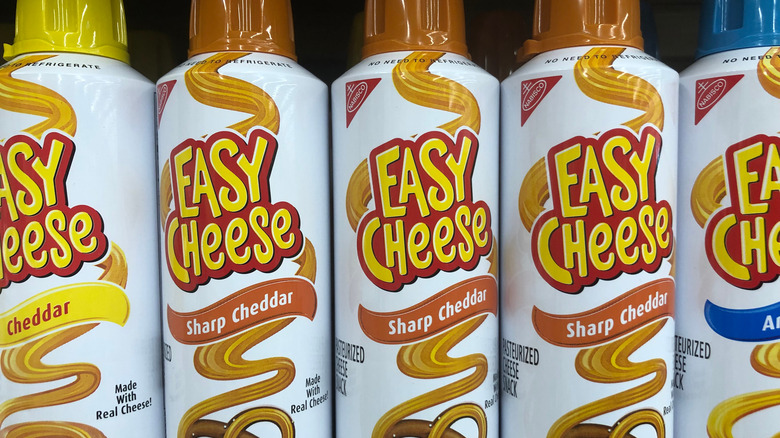The Truth About What's Really In Spray Cheese
Cheese is a glorious food. Melted on top of a pizza, folded into a subway sandwich, crumbled on top of a salad, or served alone with wine, cheese is often the highlight of a dish, adding a creamy texture and real satisfaction for the tastebuds. But in our quest to get enough of this delicacy, have we gone too far? The spray cheese that comes shooting out of a can like a hairspray is a quick and easy way to add gooey goodness to everything from baked potatoes to tortilla chips to omelets. But is it good for you?
It turns out, the short answer is a soft no. Canned and sprayed cheese contain preservatives and other chemicals that are not found in naturally processed cheeses, and some of these compounds may have serious health consequences if consumed in excess. Spray cheese contains both sodium citrate and sodium phosphate, according to the Environmental Working Group, ingredients that lead the non-profit to give it a "red" warning label to its level and method of processing.
Sodium citrate is linked to dental problems
Sodium citrate is commonly used in both pharmaceuticals and as a preservative in foods as it protects against oxidation and helps keep colors and flavors intact. In canned or spray cheese, it is used as an emulsifying agent that helps keep products made with dairy ingredients from going stale for much longer than is normally possible (via Technology.org). That's why that can of spray cheese will stay fresh in your kitchen cabinet for months while real cheese goes bad in weeks even if stored in your refrigerator. But that bad news is that all that preservation comes with a trade off.
According to a fact sheet published by the Australian Dental Association, sodium citrate is one of the common food additives that has been linked to the development of dental erosion. Because it has a citric, or acidic nature, it dissolves the protective enamel of the tooth's surface and leads to a greater risk of dental problems and sensitivity. According to the Victoria State Government Department of Health, sodium citrate is one of the three most dangerous additives when it comes to risk of tooth decay, along with citric acid and phosphoric acid. While spray cheese sure is handy when you want to instantly liven up your food, the toll it can take on your teeth may not be worth its convenience.
Sodium phosphate may cause kidney problems
Sodium phosphate is an ingredient commonly used in processed foods to create a certain texture and to enhance the shelf life of the product. It is used to thicken certain items and is also used specifically as an emulsifying agent in processed cheeses like spray cheese (via Healthline). While food-grade sodium phosphate is classified by the FDA as "generally safe" (via Healthline), some studies have found that consuming too much sodium phosphate does carry potential health risks.
According to the National Kidney Foundation, the use of oral sodium phosphate as a bowel cleaning agent, as it is sometimes used in medicine, can result in kidney failure or acute kidney injury in some cases. This happens because the phosphate crystals build up in the kidney until they cause a blockage of normal functioning (via NKF). While processed foods like cheese spray contain much less sodium phosphate than pharmaceuticals based on the compound, consumers should be aware that there is a risk associated with too much of a good thing.


